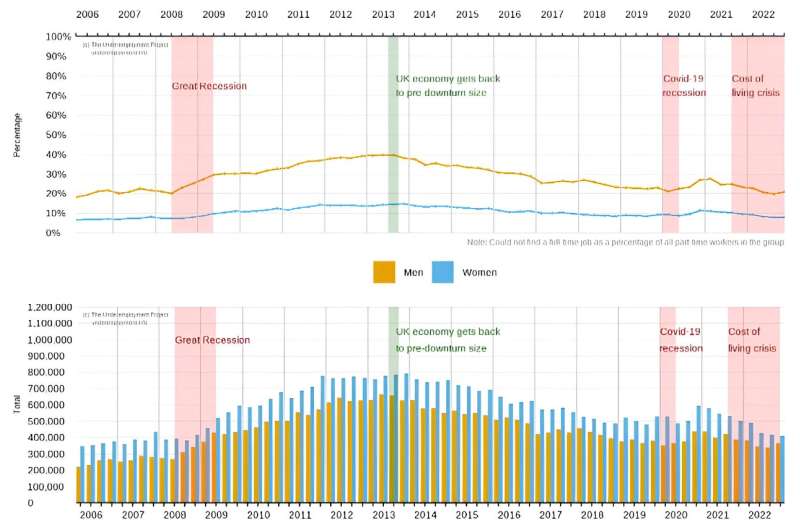This article has been reviewed according to Science X's editorial process and policies. Editors have highlighted the following attributes while ensuring the content's credibility:
fact-checked
trusted source
proofread
Women and younger workers more likely to be underemployed, UK report finds

A new research study has found that women, and younger workers, are among those most likely to be affected by underemployment, either working below their potential or preference in terms of hours spent in work, the wages earned, or the skills they use in their jobs.
The new report, entitled "Underemployment Levels and Trends: Time, skills, & wages," is part of the Underemployment Project in which Dr. Luis Torres, Mr. Miguel Munoz and Professor Tracey Warren from the University of Nottingham work alongside the universities of Bristol, Salford and West of Scotland. The research also involves collaborative work with four partners: Bristol One City, Nottingham Citizens, Salford City Council, and the Poverty Alliance, Glasgow.
The project, which will run until 2026, sees the universities explore the experiences of underemployed workers in the U.K. and analyze the characteristics of these workers using interviews from 60 individuals who self-identify as underemployed, alongside data from the Labor Force Survey, the European Working Conditions Surveys, the U.K. Household Longitudinal Study, and the CIPD's bespoke U.K. Working Lives Survey.
The first year of findings concluded that the groups most likely to experience underemployment included younger workers and workers from minority ethnic groups, as well as people employed in routine or semi-routine occupations and on precarious contracts.
Younger workers, minority ethnic workers, precarious workers, those with degrees, and people employed in intermediate occupations or in hospitality, alongside slightly more women than men, were also more likely to have skills greater than their jobs need.
The report also found that wage-underemployment is prevalent in the U.K., affecting more than a fifth of working men and almost a third of working women, impacting younger workers most heavily. Those working in food service industries, as well as managers and professionals, were also the most impacted by wage-underemployment.
Dr. Torres, who led the report in the first year of the study, said, "Underemployment has far reaching implications for workers themselves and for the organizations where they work. Understanding underemployment as a multidimensional phenomenon including insufficient hours of employment, limited use of skills at work and low wages is key to design adequate interventions in the U.K."
Further reports will develop these findings and identify the effects these elements can have in combination, exploring if for example those who suffer from wage-related underemployment are also victims of skills-related underemployment and/or time-related underemployment.
More information: Underemployment Levels and Trends: Time, skills, & wages. trends.underemployment.info/index.html
Provided by University of Nottingham



















